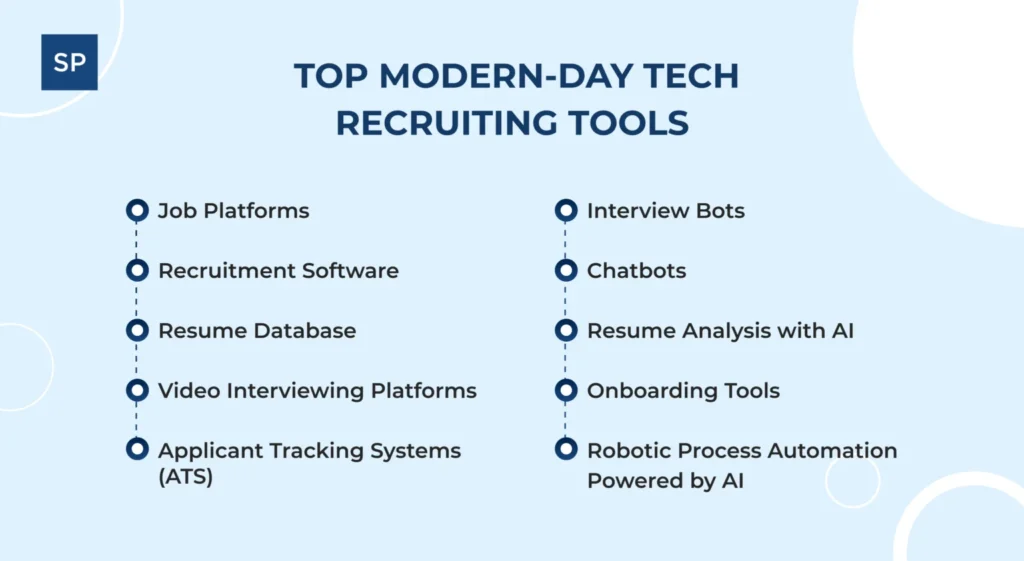-
7 Recruitment Tools to Change the Way You Work
- 1. AI-Powered Sourcing & Talent Intelligence Platforms: Finding Needles in the Global Haystack
- 2. Advanced Candidate Relationship Management (CRM) Systems: Nurturing Talent Pools Like Customers
- 3. Asynchronous Video Interviewing & Assessment Recruitment Tools: Efficiency Meets Deeper Insight
- 4. Skills Assessment & Simulation Platforms: Testing Ability, Not Just Claims
- 5. AI-Assisted Interviewing & Bias Mitigation Recruitment Tools: Augmenting Human Decision-Making
- 6. Internal Talent Marketplaces & Mobility Platforms: Unlocking Hidden Potential
- 7. Onboarding & Preboarding Automation Platforms: From Offer Accepted to Day One Productivity
- Implementing the Revolution: Strategy Over Shiny Objects
- The Future of Hiring is Here with Recruitment Tools
The war for talent isn’t just raging; it’s evolving at breakneck speed. Traditional methods – sifting through mountains of resumes, endless phone screens, and gut-feeling interviews – are increasingly inadequate. They’re slow, prone to bias, inefficient, and often leave top candidates frustrated and disengaged. To truly compete and build high-performing, diverse teams, organizations need to fundamentally revolutionize their hiring process. The key lies in strategically leveraging technology like recruitment tools not just to automate tasks, but to transform the entire candidate and recruiter experience.
This isn’t about replacing human judgment; it’s about augmenting it with powerful recruitment tools that provide deeper insights, enhance efficiency, reduce bias, and create meaningful connections.
7 Recruitment Tools to Change the Way You Work

Image Source: Staffing Partner
1. AI-Powered Sourcing & Talent Intelligence Platforms: Finding Needles in the Global Haystack
- The Problem: Relying solely on job boards and LinkedIn Recruiter means missing vast pools of passive talent. Manual sourcing is incredibly time-consuming, and identifying candidates with the right skills and potential, not just keywords, is difficult. Understanding market dynamics and compensation benchmarks is often guesswork.
- The Game-Changer: AI-driven recruitment tools (e.g., SeekOut, Hiretual, Beamery, Fetcher) go far beyond simple Boolean searches. They leverage massive datasets (public profiles, patent databases, open-source contributions, publications) and sophisticated AI to:
- Identify Passive Candidates: Find highly qualified individuals not actively looking, based on skills, experience, projects, and career trajectories, not just job titles.
- Skills-Based Sourcing: Move beyond keywords to understand the context and depth of skills, uncovering candidates who might not have the “standard” resume but possess exceptional capabilities.
- Diversity Sourcing: Actively identify candidates from underrepresented groups based on verifiable affiliations, publications, or contributions, helping build more diverse pipelines (though ethical use is paramount).
- Talent Mapping & Market Intelligence: Provide insights into competitor talent landscapes, skill availability in specific locations, and real-time compensation benchmarks.
- Predictive Analytics: Suggest candidates likely to be open to new opportunities or a strong fit based on historical data and patterns.
- The Revolution: Recruiters move from reactive resume reviewers to proactive talent scouts. They spend less time searching and more time engaging. Hiring managers gain unprecedented visibility into the talent market. Organizations build richer, more diverse talent pools proactively, reducing time-to-fill for critical roles.
2. Advanced Candidate Relationship Management (CRM) Systems: Nurturing Talent Pools Like Customers
- The Problem: Talent pipelines often leak. Candidates apply, get rejected (or ghosted), and are forgotten. Engaging passive candidates requires manual effort that’s hard to scale. Building meaningful relationships over time is nearly impossible with spreadsheets and basic ATS functionality. Employer branding efforts lack targeted outreach.
- The Game-Changer: Recruitment CRMs (e.g., Beamery, Phenom, Avature, SmashFly) function like sophisticated marketing automation platforms, but for talent. They focus on the entire candidate lifecycle before an application:
- Centralized Talent Database: Aggregate candidate data from all sources (sourcing, events, referrals, past applications) into a single, searchable profile.
- Segmentation & Personalization: Segment candidates based on skills, location, interests, engagement level, etc., enabling highly targeted communication.
- Automated Nurture Campaigns: Send personalized, relevant content (blog posts, event invites, company updates, job alerts) to keep candidates warm and build brand affinity over months or years.
- Event & Campaign Management: Track engagement from career fairs, webinars, and targeted sourcing campaigns.
- Candidate Experience Focus: Provide branded career sites, easy application processes, and consistent communication touchpoints.
- Analytics: Measure pipeline health, source effectiveness, and engagement rates.
- The Revolution: Recruitment tools transform from transactional (filling reqs) to relational (building communities). Organizations cultivate robust talent pipelines, dramatically reducing sourcing costs per hire and time-to-fill. Candidates feel valued and engaged, significantly enhancing employer brand perception and increasing the likelihood of future applications or referrals. It enables true talent pipelining for future needs.
3. Asynchronous Video Interviewing & Assessment Recruitment Tools: Efficiency Meets Deeper Insight
- The Problem: Scheduling live HR interviews is a logistical nightmare, especially across time zones. Initial phone screens are inefficient and provide limited insight. Assessing core competencies consistently at scale is challenging. Unconscious bias can creep into early evaluations.
- The Game-Changer: Platforms like HireVue, Modern Hire, Willo, Vervoe, and MyInterview allow candidates to record responses to structured questions on their own time. But the revolution goes beyond convenience:
- Structured, Competency-Based Assessments: Questions are designed to elicit specific skills (problem-solving, communication, technical know-how) using consistent criteria for all candidates.
- Pre-Employment Testing Integration: Seamlessly incorporate skills tests, cognitive assessments, or personality inventories within the same platform.
- AI-Powered Analysis (Use with Caution): Some platforms offer AI analysis of verbal and non-verbal cues to predict fit or competency scores. Crucially, the best practice is using this as a supplement, not a replacement, for human review, with rigorous auditing for bias.
- Blind Review Capabilities: Some platforms allow anonymized review (hiding name, school, etc.), focusing solely on responses to reduce initial bias.
- On-Demand Candidate Experience: Candidates appreciate the flexibility to interview when it suits them best.
- Efficiency Gains: Recruiters and hiring managers can review responses quickly, filtering candidates more effectively before investing in live interviews.
- The Revolution: The initial screening process becomes dramatically faster and more efficient, freeing up significant recruiter time. Assessments become more objective and focused on actual job-relevant skills. Candidate experience improves through flexibility. Organizations gain a scalable way to evaluate core competencies fairly at the top of the funnel, ensuring only the most qualified move forward.
4. Skills Assessment & Simulation Platforms: Testing Ability, Not Just Claims
- The Problem: Resumes list skills; they don’t prove them. Technical interviews can be inconsistent and stressful. Gauging soft skills (communication, collaboration) or complex problem-solving abilities through interviews alone is unreliable. Hiring based on pedigree perpetuates bias.
- The Game-Changer: Platforms like HackerRank (coding), Codility (coding), Vervoe (multi-domain), TestGorilla (multi-domain), Criteria Corp (cognitive/aptitude), and even specialized simulation recruitment tools (e.g., for sales pitches, customer service scenarios) allow candidates to demonstrate their abilities in realistic or job-relevant contexts:
- Job-Relevant Challenges: Candidates solve real-world problems they would encounter on the job (coding tasks, data analysis, writing samples, case studies, role-plays).
- Objective Scoring: Performance is measured against predefined benchmarks, reducing subjectivity.
- Focus on Potential: Some platforms assess learning agility or cognitive ability, helping identify candidates with high potential who might lack specific experience.
- Reduced Bias: Focusing on demonstrable skills helps mitigate bias related to background, education, or personal characteristics.
- Improved Candidate Experience (When Done Right): Candidates appreciate the chance to showcase their actual abilities rather than just talk about them. Crucially, these should be used appropriately, relevant to the job, not overly lengthy, and with clear feedback.
- The Revolution: Hiring decisions shift from “Who looks good on paper?” or “Who interviewed well?” to “Who can actually do the job?”. Quality of hire increases significantly as candidates are validated on core competencies upfront. Bias in the technical assessment phase is substantially reduced. Organizations build teams based on proven capability and potential.
5. AI-Assisted Interviewing & Bias Mitigation Recruitment Tools: Augmenting Human Decision-Making
- The Problem: Interviews, while essential, are inherently subjective. Unconscious bias (affinity bias, halo/horn effect, confirmation bias) can significantly influence evaluations. Taking comprehensive, unbiased notes in real-time is difficult. Comparing candidates consistently across multiple interviewers is challenging.
- The Game-Changer: Recruitment tools like BrightHire, Metaview, Dover, and features within platforms like HireVue or Beamery use AI to support interviewers during and after live interviews:
- Structured Interview Guides: Ensure all candidates are asked consistent, job-relevant questions, improving fairness and comparability.
- Automated Note-Taking & Transcription: AI accurately transcribes the conversation, freeing interviewers to focus fully on the candidate.
- Bias Alerts: Analyze language in questions or interviewer notes for potential indicators of bias (e.g., gendered language, irrelevant focus on background).
- Highlight Reels & Summarization: Quickly identify key moments or generate summaries of long interviews for easier review and calibration.
- Calibration Insights: Help hiring teams compare evaluations and identify inconsistencies in scoring.
- The Revolution: Interviews become more structured, fair, and efficient. Interviewers are empowered with recruitment tools that help them mitigate their own unconscious biases and focus on objective criteria. Hiring decisions are based on richer, more consistent data. The focus shifts from gut feeling to data-supported evaluation, leading to fairer outcomes and better hires.
6. Internal Talent Marketplaces & Mobility Platforms: Unlocking Hidden Potential
- The Problem: Internal hiring is often ad-hoc and reliant on personal networks, leaving great internal candidates undiscovered. Employees feel stagnant, leading to higher turnover. Skills gaps are addressed through costly external hiring, while existing talent is underutilized. Succession planning lacks visibility.
- The Game-Changer: Recruitment tools like Gloat, Fuel50, Eightfold Talent Intelligence (with mobility features), and even advanced features in HCMs like Workday or SAP SuccessFactors create dynamic ecosystems for internal talent:
- Skills Ontology: Map the skills of your entire workforce, creating a detailed internal skills inventory.
- AI-Driven Matching: Connect employees (based on skills, aspirations, potential) to internal opportunities (projects, gigs, mentorships, full-time roles) they might not have found otherwise.
- Career Pathing & Development: Provide personalized recommendations for learning and growth opportunities to help employees advance internally.
- Gig Work & Project Marketplaces: Enable employees to work on cross-functional projects, gaining new skills and visibility.
- Visibility for Managers: Help managers identify internal talent for open roles and understand team skill gaps.
- The Revolution: Talent acquisition recruitment tools expand their scope to include proactive internal mobility. Organizations dramatically reduce hiring costs by filling more roles internally. Employee engagement and retention soar as people see clear paths for growth. Skills gaps are addressed by leveraging existing talent. Succession planning becomes data-driven and dynamic. It transforms the organization into a fluid talent ecosystem.
7. Onboarding & Preboarding Automation Platforms: From Offer Accepted to Day One Productivity
- The Problem: The period between offer acceptance and day one is critical but often chaotic. Manual paperwork, scattered communication, lack of preparation, and poor first impressions lead to new hire anxiety, delayed productivity, and even regrettable attrition (“ghosting” before starting).
- Game-Changer: While technically post-offer, modern onboarding platforms (e.g., Sapling, BambooHR Onboarding, Enboarder, WorkBright, Click Boarding) are integral to the recruitment revolution by ensuring the positive candidate experience translates into successful employment:
- Automated Workflows: Trigger personalized sequences of tasks, forms, emails, and reminders for HR, hiring managers, IT, and the new hire.
- Digital Paperwork: E-signatures, digital I-9 verification, and centralized document management eliminate piles of forms.
- Personalized Preboarding Portals: Provide new hires with essential information (benefits, policies, team intros, first-day schedule), welcome messages, and even introductory tasks before day one.
- Task Management & Visibility: Track completion progress for all stakeholders, ensuring nothing falls through the cracks.
- Engagement & Connection: Facilitate introductions to team members, assign buddies/mentors, and foster a sense of belonging before the start date.
- The Revolution: The candidate journey seamlessly transitions into a positive, structured employee experience from day zero. New hires feel welcomed, prepared, and valued, leading to faster time-to-productivity and significantly higher retention rates. Administrative burdens on HR and hiring managers are drastically reduced. The investment in great recruitment is fully realized by setting new hires up for immediate success.
Implementing the Revolution: Strategy Over Shiny Objects
Adopting these recruitment tools is not about chasing the latest tech fad. A successful revolution requires strategy:
- Identify Your Pain Points: What are your biggest hiring challenges? Slow time-to-hire? Poor quality of hire? Lack of diversity? High candidate drop-off? Start there.
- Define Clear Objectives: What specific outcomes do you want each tool to achieve (e.g., reduce time-to-fill by 20%, increase diverse hires by 15%, improve candidate satisfaction score to 4.5/5)?
- Prioritize Integration: How will the new tool integrate with your existing ATS, HCM, and other systems? Siloed data kills efficiency. APIs are crucial.
- Focus on Change Management: Technology is only part of the solution. Prepare your recruiting team, hiring managers, and candidates for the new processes. Provide thorough training and support.
- Ethics & Bias Mitigation: Especially with AI recruitment tools, demand transparency. Understand how algorithms work, what data they’re trained on, and rigorously audit for bias. Never fully remove human oversight from critical decisions. Ensure compliance with data privacy regulations (GDPR, CCPA).
- Candidate Experience First: Evaluate every tool through the lens of the candidate. Does it make the process easier, faster, fairer, and more engaging? Avoid overly burdensome assessments or impersonal automation.
- Start Small, Scale Smart: Pilot a tool with one team or for one role type before a full rollout. Measure results rigorously and iterate.
The Future of Hiring is Here with Recruitment Tools
The recruitment landscape has irrevocably changed. The tools outlined here represent more than incremental improvements; they offer a paradigm shift. By embracing AI for smarter sourcing and insights, CRMs for relationship building, asynchronous and skills-based assessments for fairer evaluation, internal marketplaces for unlocking potential, and seamless onboarding for retention, organizations can move beyond the limitations of the past.
This revolution isn’t about replacing recruiters; it’s about empowering them. It frees them from administrative drudgery and arms them with data and recruitment tools to become true strategic talent advisors. It enables them to find hidden gems, assess true potential, build meaningful pipelines, and create exceptional experiences that attract and retain the very best talent.
The companies that strategically adopt and integrate these game-changing recruitment tools will not just fill roles faster; they will build more capable, diverse, engaged, and future-proof workforces. They will transform recruitment from a cost center into a powerful competitive advantage.




